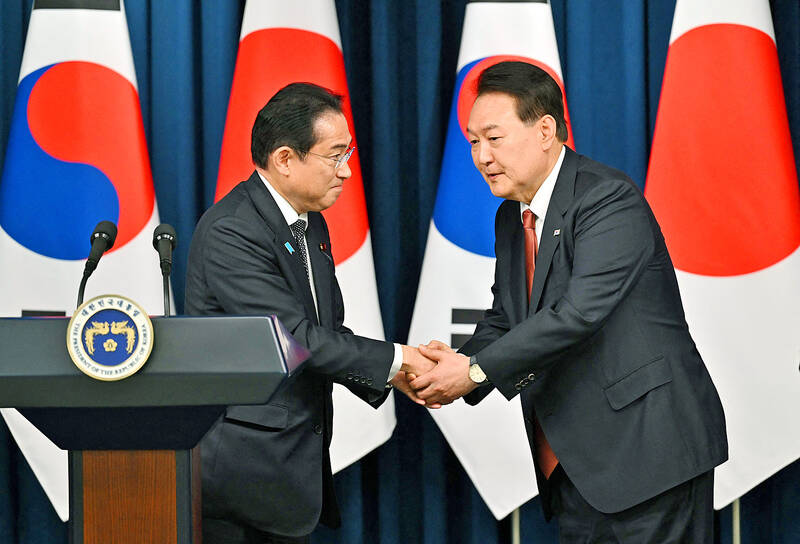Japanese Prime Minister Fumio Kishida yesterday said his “heart aches” for Koreans who suffered under colonialism, as Seoul and Tokyo seek a rapid reset of long-strained ties in the face of North Korean threats.
Kishida was in Seoul on the first official bilateral visit by a Japanese leader to South Korea in more than a decade. He met South Korean President Yoon Suk-yeol, who has made improving testy relations with Japan a top priority for his administration.
The East Asian neighbors, both crucial security allies of the US, have long been at odds over historic issues linked to Japan’s brutal 1910 to 1945 colonial occupation of the Korean Peninsula, including sexual slavery and forced labor.

Photo: AFP
“My heart aches as many people went through a very difficult and sad experience in the harsh environment at that time,” Kishida said, speaking after the summit with Yoon.
Kishida’s visit showed that “shuttle diplomacy” — regular mutual visits and high-level talks — was back on track, Yoon said, after a lengthy pause during a bitter trade spat linked to the forced labor issue.
“Based on the friendship and trust I have with Prime Minister Kishida, I will promote deeper bilateral cooperation toward a new future,” said Yoon, who was in Tokyo in March for a fence-mending visit.
Yoon, who took office last year, has sought to bury the historical hatchet.
He earlier announced a plan to compensate victims without direct involvement from Tokyo — a move that was unpopular domestically, but helped improve ties with Japan.
“As the South Korean government moves forward ... I am touched to see how so many people are opening their hearts to the future while not forgetting the hardships of the past,” Kishida said.
Experts had widely predicted Tokyo would not offer a new apology, and Kishida stopped short of this, instead reaffirming the “heartfelt apology” made by previous administrations in Tokyo.
“There are parts of Kishida’s statement that definitely fall short of our expectations,” Choi Eunmi, a researcher at the Asan Institute for Policy Studies, told YTN.
“But even though he said it was his personal feeling, I would like to note his expression of sincerity,” she said. “And I think this is meaningful as we are just taking our first step in restoring shuttle diplomacy.”
Efforts to mend ties come as North Korean leader Kim Jong-un, who last year declared his country an “irreversible” nuclear power, doubles down on weapons development and testing.
“Prime Minister Kishida and I shared the recognition that North Korea’s nuclear and missile development poses a grave threat to peace and stability not only on the Korean Peninsula and Japan, but also throughout the world,” Yoon said.
The leaders agreed to hold a trilateral meeting with the US on the sidelines of the upcoming G7 summit in Hiroshima.
US President Joe Biden’s administration has been seeking help from its partners to impose sweeping curbs on the sale of advanced chips equipment to China in a policy aimed at preventing the country’s progression in a range of cutting-edge technologies.
Yoon and Kishida yesterday agreed to cooperate on chips, without elaborating on what the partnership would entail.
Additional reporting by Bloomberg

The Taiwanese passport ranked 33rd in a global listing of passports by convenience this month, rising three places from last month’s ranking, but matching its position in January last year. The Henley Passport Index, an international ranking of passports by the number of designations its holder can travel to without a visa, showed that the Taiwan passport enables holders to travel to 139 countries and territories without a visa. Singapore’s passport was ranked the most powerful with visa-free access to 192 destinations out of 227, according to the index published on Tuesday by UK-based migration investment consultancy firm Henley and Partners. Japan’s and

NATIONAL SECURITY THREAT: An official said that Guan Guan’s comments had gone beyond the threshold of free speech, as she advocated for the destruction of the ROC China-born media influencer Guan Guan’s (關關) residency permit has been revoked for repeatedly posting pro-China content that threatens national security, the National Immigration Agency said yesterday. Guan Guan has said many controversial things in her videos posted to Douyin (抖音), including “the red flag will soon be painted all over Taiwan” and “Taiwan is an inseparable part of China,” while expressing hope for expedited “reunification.” The agency received multiple reports alleging that Guan Guan had advocated for armed reunification last year. After investigating, the agency last month issued a notice requiring her to appear and account for her actions. Guan Guan appeared as required,

Japan and the Philippines yesterday signed a defense pact that would allow the tax-free provision of ammunition, fuel, food and other necessities when their forces stage joint training to boost deterrence against China’s growing aggression in the region and to bolster their preparation for natural disasters. Japan has faced increasing political, trade and security tensions with China, which was angered by Japanese Prime Minister Sanae Takaichi’s remark that a Chinese attack on Taiwan would be a survival-threatening situation for Japan, triggering a military response. Japan and the Philippines have also had separate territorial conflicts with Beijing in the East and South China

A strong cold air mass is expected to arrive tonight, bringing a change in weather and a drop in temperature, the Central Weather Administration (CWA) said. The coldest time would be early on Thursday morning, with temperatures in some areas dipping as low as 8°C, it said. Daytime highs yesterday were 22°C to 24°C in northern and eastern Taiwan, and about 25°C to 28°C in the central and southern regions, it said. However, nighttime lows would dip to about 15°C to 16°C in central and northern Taiwan as well as the northeast, and 17°C to 19°C elsewhere, it said. Tropical Storm Nokaen, currently